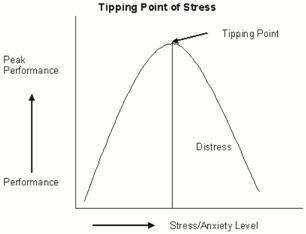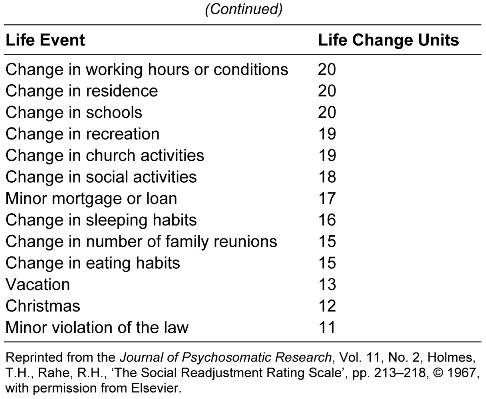 What Is Stress?
What Is Stress?  What Is Stress?
What Is Stress?
Stress is a very normal human reaction to a perceived threat from any source. A certain amount of stress in our lives is good for all of us. Stress can mean different things to different people. It can have a positive and a negative effect. Stress can be positive when it motivates us to get things done that are important to us. However, it can be negative when we constantly feel pressurised or traumatised by too many demands.
Without some stress we could not get out of bed in the morning, never mind do a day’s work. However, when we are under too much stress or when the stress we are under exceeds our ability to cope, stress can turn into ‘distress’. By distress I mean that the level of stress we are under is having a negative effect on us. This can be bad for both our short- and long-term health, with potential adverse health consequences.
What Happens to Our Bodies When We Are Under Stress?
Stress wakens up or arouses our system, so that we experience the ‘fight or flight’ response. At a primitive level this meant that when a caveman was walking in the woods and came across a big brown bear his body could make very quick adjustments so that he could take drastic action and save himself from the bear.
The heart starts to beat faster and pump more blood, raising the blood pressure. The pupils (the dark parts) of the eyes widen to allow in more light, the breathing gets faster and the tubes going into the lungs widen to let in more oxygen, the mind becomes more alert, blood is diverted towards the muscles, which become tense and ready for action, while blood is diverted away from the gut and the skin, which becomes cold and clammy. As well as that, hormones called adrenaline and cortisol are pumped into the blood, which causes the blood sugar to rise providing an immediate source of energy. Changes also occur in the blood, enabling it to clot more easily – a basic protective mechanism to enable quick repair of any wounds. All of these changes happen very quickly, allowing our caveman to fight or take flight. In the case of our brown bear, his best option is to leg it as fast as he can.

So, as you can see, stress is an essential and very useful mechanism by which the body and mind can adapt to rapidly changing circumstances. Stress can be good for our health and welfare and is a necessary tool for survival.
You can see from the diagram (above) that a certain amount of stress increases performance; however, once the amount of stress we are under goes beyond a certain point, known as the ‘tipping point’, then performance actually starts to reduce with increasing amounts of stress. In this situation we are in a state of distress, which can be very harmful to our health. The amount of stress we can individually cope with varies from person to person. This may tend to depend at least partly on personality, but also on our own coping mechanisms for dealing with stress.
Studies also show that men and women handle stress differently. This may in part be due to biological reasons. Also, men often don’t have the strong social support networks that women have to turn to during times of stress. These social supports may help explain why women, in general, seem to be better able to cope with stress than men.
Modern life can be stressful and Irish men seem to have become increasingly susceptible to stress and other mental health problems. Large numbers of Irish men suffer from stress, but often in silence. Irish men are slow to seek help with mental health issues, including stress. This may be for many reasons, including ignorance, fear, embarrassment or the perception that admitting to being stressed in some way implies inadequacy or weakness. It goes back to the attitude that ‘real’ men don’t go to the doctor and that big boys don’t cry. Unfortunately this type of attitude does nothing to help Irish men or their loved ones.
Is Stress Harmful?
The precise mechanisms that govern the interactions between stress and ill-health remain poorly understood. However, it is felt that chronic stress can affect the quality of the immune system, causing the body’s own natural defences against illness to be lowered. One possible explanation for this is that prolonged job stress may affect the nervous system. Another possible reason for this is the fact that chronic stress may affect the body’s hormonal balance and result in a weakened immune system.
Chronic stress is a risk factor for heart disease. Research has found a link between chronic stress and the development of heart disease, type 2 diabetes and metabolic syndrome. Metabolic syndrome is the presence of three or more of the following five factors: high blood pressure, central obesity (excessive abdominal fat), raised blood fat (triglycerides), low HDL cholesterol (see Chapter 6) and raised blood sugar.
Chronic stress is also associated with many other medical conditions, including:
Stress and Heart Disease
Chronic stress – or rather distress – is thought to be a risk factor for heart disease in later life. Anger and hostility can be powerful emotions with the potential to trigger a heart attack.
The link between stress and heart disease is complex and not fully understood. If you feel stressed, your body will produce more stress hormones. Although they are useful in small quantities, too much of these hormones, continuously and over time, can damage your arteries and may lead to high blood pressure. Also, when life becomes pressurised, people are more likely to smoke more cigarettes, drink more caffeine, drink too much alcohol and be less physically active. All of these things can contribute to heart problems.
Symptoms and Signs of Stress in Irish Men
Your relationships and your performance at work, at home and in the bedroom can all be affected by excess stress. Telltale signs of stress building up include some or all of the following symptoms:
The Type A Personality
‘One man’s meat is another mans’ poison’, as the saying goes. What’s stressful to one man may be all in a day’s work for another. The difference appears to lie in our perceptions of various events. It is felt that personality can play a major role in how we perceive and cope with stress.
Many factors influence and shape our character. These include a large inbuilt or genetic component. We have our own unique temperament when we are born. This is further influenced by our life’s experiences, which affects our individual way of thinking, feeling and behaving. This is your personality.
Men with ‘Type A’ personalities, for example, tend to be in a hurry, ambitious, time-conscious and driven. These traits, if not properly managed, can create stress-related illnesses.
On the other hand, men with ‘Type B’ personalities are much more relaxed, and less time-conscious and driven. Type B personalities are better able to put things into perspective, and think through how they are going to deal with situations. Consequently, they tend to be less prone to the adverse effects of stress.
Type A Personality Traits
The term ‘Type A personality’ has become a household phrase over the past fifty years. Type A behaviour includes time urgency, impatience, rudeness and ‘having a short fuse’. Additionally, Type A behaviour often includes competitiveness and a strong orientation towards high achievement.
Physical characteristics that can result from years of chronic stress and Type A behaviour include teeth grinding, tight lips and a clenched jaw.
Negative Effects of Type A Behaviour
Over the years, the extra stress that most Type A people experience takes a toll on their health and lifestyle. Type A men usually find themselves in stressful, demanding occupations (and sometimes the jobs create the Type A behaviour), which can lead to health problems. The following are some of the negative effects that are common among those exhibiting Type A behaviour:
Burnout
Burnout is a term used to describe someone who is completely mentally and physically exhausted. Chronic stress can cause burnout, so that a person becomes emotionally exhausted and feels a strong lack of personal accomplishment. There are many early warning signs of burnout:
Stress Busters
The good news is that there are several things you can do to stay healthy and reverse many of the negative effects of stress in a surprisingly short amount of time, with a few relatively minor lifestyle changes. Men who cope best with stress seem to have these things in common:
There is no doubt a healthy lifestyle can protect against the adverse effects of stress. A good, regular exercise programme, combined with a healthy diet and adequate relaxation time, can be a great counterbalance to a stressful job. Getting enough sleep and maintaining a positive outlook are also important for overall health.
Stress management is a life skill which we men can learn. While there is no such thing as a one-size-fits-all solution, the following list of stress busters can help combat the adverse effects of stress.
Get in Touch with Your Emotions
Reduce Daily Stressors by Taking Control – Change What You Can
Even men with the most adaptable personalities can experience the effects of long-term stress if they lack a sense of control over aspects of their daily lives. You can reduce stress in your life by making lifestyle changes like becoming more organised and better at managing time, rather than allowing time to manage you.
Time Management
Lifestyle Choices
Enjoy Yourself
Consider Relaxation Techniques
These can help your health by activating your body’s relaxation response (the mechanism in your body that counteracts the ‘fight or flight’ response to stress, helping hormone levels and other systems to return to normal):
How Much Stress Am I Under?
To measure stress according to the Holmes and Rahe Stress Scale, the number of ‘life change units’ that apply to events in the past year of an individual’s life are added and the final score will give a rough estimate of how stress affects health.


Score of 300+: At risk of stress-induced illness
Score of 150–299+: Risk of stress-induced illness is moderate (reduced by 30 per cent from the above risk)
Score of less than 150: Only have a slight risk of stress-induced illness
Anxiety
Anxiety is an unpleasant condition characterised by a tendency to worry excessively. It can occur in up to 8 per cent of Irish men. This excessive worry is accompanied by physical symptoms, such as sweaty hands, irritability, restlessness, bowel symptoms such as wind, light-headedness, muscle tension and aches. Anxiety disorder can bring on physical illness and it has been associated with an increased risk of heart disease in particular. It can lead to alcohol abuse or other substance abuse. The key to treating and managing anxiety is to first recognise it exists. Keep a detailed symptom diary for a week or so.
Anxiety can be a prominent symptom of clinical depression, so if you are a man and feel anxious you should have a good chat with your family doctor, who will be able to help you decide if it is lifestyle factors, adverse effects of alcohol, anxiety disorder, clinical depression or a combination of all of the above that are contributing to your symptoms.
Treatment
Keeping a detailed lifestyle diary for a week or two, including everything you eat and drink, your exercise levels and your perceived levels of stress, can give you a very useful insight into the role your lifestyle is playing in your symptoms.
Exercise can be an excellent way to combat the effects of stress and get rid of tension. It can often be worth quitting alcohol for a month or so to see what effect that has on your physical and mental well-being. At the very least, keep your alcohol intake within recommended limits (no more than 21 units per week, of which no more than 4 units per day). Minimise your intake of stimulants such as caffeine.
Relaxation exercises, including deep breathing and meditation, can be very helpful for stress also. Counselling can sometimes be very effective for anxiety. Your doctor may prescribe some medication for you, particularly if he feels you are lacking in serotonin. The following are some tricks and techniques to help you de-stress.
Key Points
